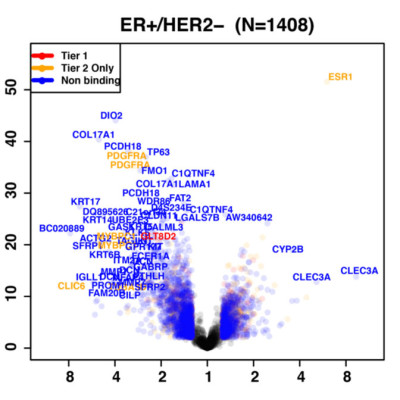Abstract
The magnitude and scope of intrinsic age-correlated and host endocrine age-correlated gene expression in breast cancer is not well understood. From age-correlated gene expression in 3,071 breast cancer transcriptomes and epithelial protein expression of 42 markers in 5,001 breast cancers and 537 normal breast tissues, we identified a majority of age-correlated genes as putatively regulated by age-dependent estrogen signaling. Surprisingly, these included genes encoding the chromatin modifier EZH2 (which had a negative age correlation) and associated H3K27me3 (which had an inverse, positive age correlation). Among The Cancer Genome Atlas lung, thyroid, kidney and prostate transcriptomes, the largest overlap with breast cancer in age-correlated transcripts was lung cancer, for which about one-third of overlapping age-correlated transcripts appeared to be estrogen regulated. Age-quartile-stratified outcomes analysis of 3,500 breast cancers using EZH2, H3K27me3, FOXA1 and BCL2 proteins revealed distinct age-related prognostic significance. Age correlation in gene expression may thus be an important factor in ER, EZH2, H3K27me3 and other biomarker assessment and treatment strategies.
